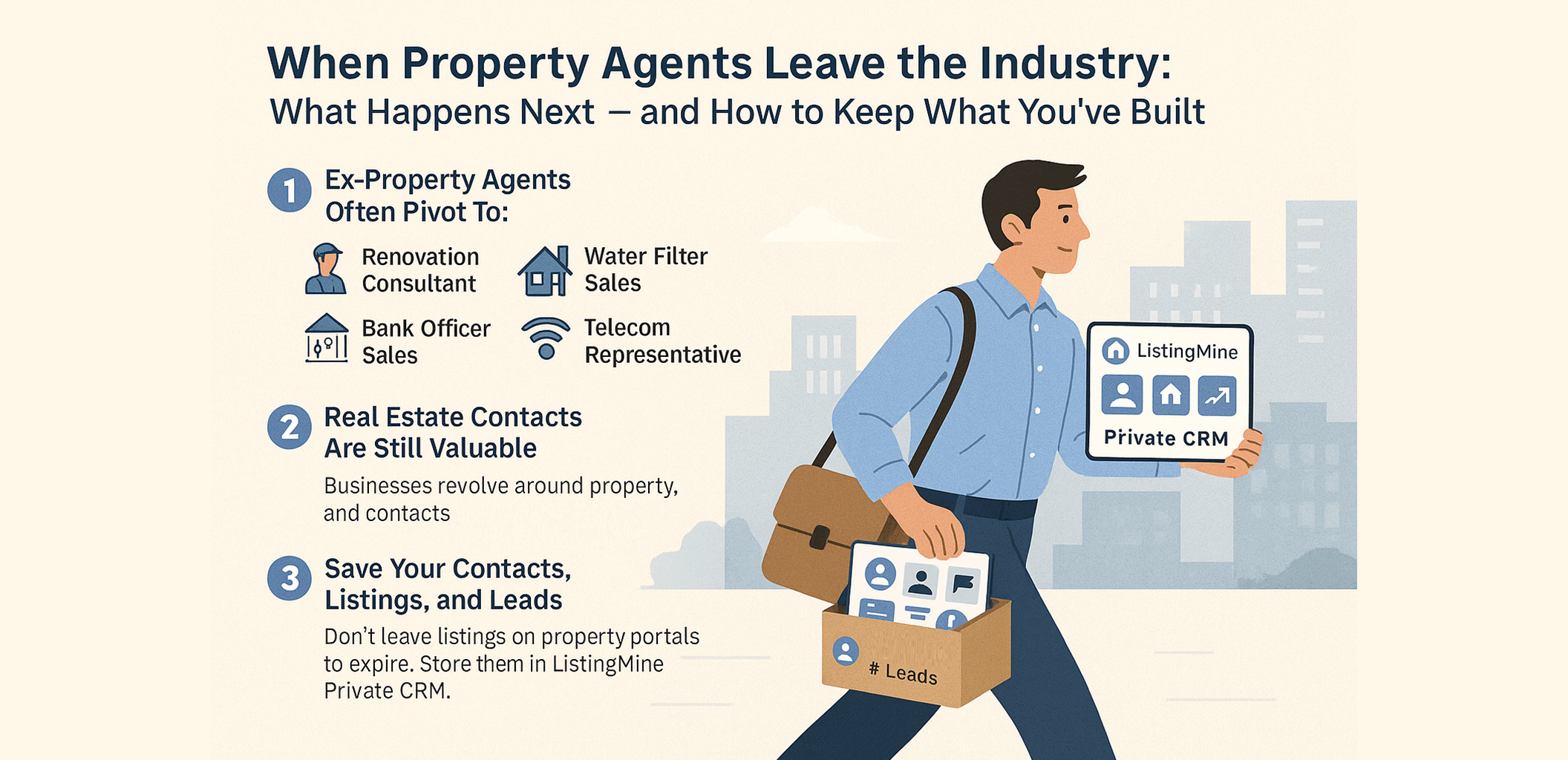When Property Agents Leave the Industry: What Happens Next — and How to Keep What You’ve Built

Not every agent stays in real estate forever.
Some move on after a slow year.
Some leave for family reasons.
Some just want stability again.
Whatever the reason, leaving doesn’t mean failure.
It simply means your career is evolving.
The real question is:
When you leave, what happens to everything you’ve built?
1. The Reality: Many Agents Don’t Stay Forever
Thousands join the property industry every year.
Thousands also quietly exit — often without a plan.
Some lose confidence after months without a deal.
Some discover they prefer a predictable paycheck.
Some just need a break.
It’s a natural cycle.
But what’s tragic is that many walk away leaving behind years of effort — leads, contacts, and relationships that could still open doors later.
2. Life After Real Estate — The Many Paths Agents Take
The skills you learned in real estate — communication, negotiation, follow-up, problem solving — are universal. That’s why former agents appear everywhere once they leave.
Here are some of the common paths:
- Corporate roles: Admin, customer service, operations, HR, or marketing support
- Financial sector: Banker, mortgage consultant, loan officer, or insurance advisor
- Service trade: Renovation, interior design, property maintenance, cleaning, or move-in services
- Telecom & utilities: Unifi, Maxis, solar systems, home alarms, or IoT packages
- Product sales: Water filters, air-conditioners, appliances, or smart-home devices
- Transport & gig economy: Grab, Lalamove, or delivery-based income
- Professional careers: Accountant, clerk, property management executive
- Entrepreneurship: Starting your own business, from online stores to training programs
Some jobs are completely unrelated.
Others stay connected to the property world.
But in both cases, your network remains your advantage.
3. What You Still Have (Even After You Leave)
Even if you no longer sell houses, you still have something most people don’t — a trusted contact base.
You know hundreds of owners, buyers, lawyers, and bankers.
You understand neighborhoods, projects, and market patterns.
You’ve built trust through service, not advertising.
Those relationships are real capital.
Maybe not today, but one day someone in that list will still need help — refinance, renovate, rent, or recommend you to a new client in your next role.
And here’s the truth most people overlook:
Almost every business still revolves around property.
People will always need a place to live, an office to operate, or a location to expand.
If you become a banker, renovator, insurance agent, telco rep, or even a business owner — your old property network remains relevant.
Your ex-clients can become your new customers.
Your co-brokers can become referral partners.
Your developers can become suppliers.
If you lose your contacts, you lose your leverage.
If you keep them, they’ll keep working for you — long after you’ve left real estate.
4. Don’t Delete — Preserve
Before you move on, take one weekend to secure your data. Those names, numbers, notes, and listings represent years of conversations and trust.
Even if you never sell property again, that database might help you:
- When you start a renovation or utility business
- When you pivot into banking or insurance
- When you sell new services to homeowners
- When you return to real estate later
And here’s a mistake too many ex-agents make — don’t leave your listings behind on paid portals and let them rot after your subscription ends.
Those were your effort, your photos, your descriptions, your connections.
Once the portal access expires, all of that disappears.
Instead, save your listings in ListingMine — your own private vault where your data stays under your control, even if you’re no longer active in the market.
That’s why your exit plan should include data continuity — not data loss.
5. ListingMine Private CRM — Your Safety Net for the Future
Even if you leave the industry, ListingMine Private CRM lets you:
- Store all your past contacts, listings, and leads privately — not tied to any agency
- Tag clients by type (buyer, owner, lawyer, banker) for future reference
- Upload offer letters, agreements, or viewing notes for reuse
- Set light reminders for anniversaries, renewals, or reconnections
- Log in anytime — even years later — if you decide to return
It’s your personal archive of professional capital — a digital memory that stays yours forever.
You don’t have to keep selling to keep your data valuable.
You just have to keep it safe.
6. The Lesson
When one chapter closes, don’t throw away the pages.
Your years in real estate taught you more than you realize — how to talk to people, solve problems, and build trust. That experience will follow you into whatever you do next.
Keep your contacts, keep your options.
Because opportunity has a way of finding those who stay ready.
ListingMine Private CRM:
Don’t lose your hard work.
Save it, own it — and use it again when opportunity knocks.











































































































